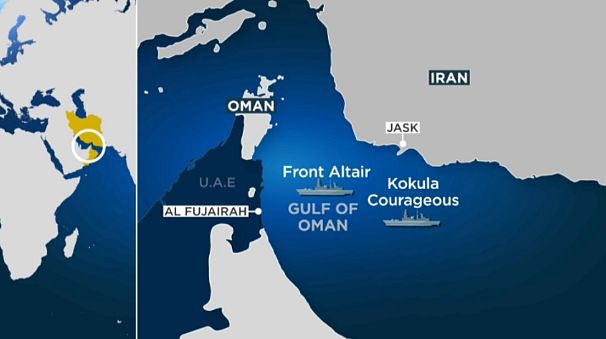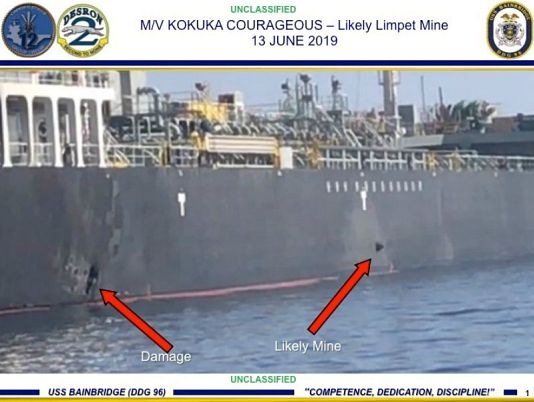Here we break down the controversy that prompted the US to point the finger at Iran.
Tensions between the US and Iran increased after Washington accused Iran of masterminding Thursday's attacks on two oil tankers in the Gulf of Oman, which Tehran vehemently denies.
What happened?
The two oil tankers were attacked at dawn on Thursday about 40 kilometres (25 miles) off the southern coast of Iran.
The first ship hit was the Front Altair, owned by Frontline, a Norwegian company. The boat, carrying 75,000 tonnes of naphtha — a flammable hydrocarbon mixture — was travelling from the United Arab Emirates to Taiwan.
A fire broke out and the 23 crew members were evacuated. They were picked up by a passing ship which handed them over to an Iranian search and rescue vessel, according to the Islamic Republic News Agency (IRNA).
Taiwanese refiner CPC Corp, which had chartered the Front Altair, said the ship was "suspected of being hit by a torpedo".
Shortly after, the Kokuka Courageous, which was travelling to Singapore after picking methanol from Saudi Arabia and Qatar, also called for help after a fire broke out in the engine room.
The 21 crew members were rescued by the USS Bainbridge, which was 30 nautical miles away when they received the distress call.
The president of Japanese owner Kokuka Sangyo, Yutaka Katada, told reporters that ship was attacked twice in three hours.
"The crew is saying that it was hit by a flying object. They are saying that something came flying. To put a bomb on the side of the boat is something we are not thinking," he added.
'Iran is responsible'
The US has blamed Iran for the attacks on the two tankers.
"This assessment is based on intelligence, the weapons used, the level of expertise needed to execute the operation, recent Iranian attacks on shipping and the fact that no proxy group operating in the area has the resources and proficiency to act with such a high degree of sophistication," US Secretary of State Mike Pompeo told reporters.
To back its claim, the US military released footage purported to show an Iranian military patrol boat approach the Kokuka Courageous to remove an "unexploded limpet mine," according to a statement by the US Navy.
The US also released still images of the Kokuka Courageous it says shows the unexploded mine on the side of the tanker.
UK also blames Iran
The UK has also blamed Iran and its Islamic Revolutionary Guard Corps on Friday for the attacks on the tankers.
In a statement, British Foreign Secretary Jeremy Hunt condemned the attacks and said they had violated international norms and called on Iran to stop all forms of "destabilising behaviour".
"These latest attacks build on a pattern of destabilising Iranian behaviour and pose a serious danger to the region," he said.
'Suspicious'
Iran has "categorically" refuted the US' "unfounded" accusations, the country's mission to the United Nations said in a statement.
Javad Zarif, Iran's Foreign Minister, posted on Twitter that "suspicious doesn't begin to describe what likely transpired this morning."
"That the US immediately jumped to make allegations against Iran — without a shred of factual or circumstantial evidence — only makes it abundantly clear that the #B_Team [which refers to US national security advisor John Bolton, Israeli president Benjamin 'Bibi' Netanyahu, Saudi Arabia Crown Prince Mohammed bin Salman and Abu Dhabi Crown Prince Mohammed bin Zayed] is moving to a #PlanB: Sabotage diplomacy," he added, accusing them of conducting "economic terrorism" against Iran.
'State actor'
Four tankers — from the UAE, Saudi Arabia and Norway — were also targeted by such attacks last month off the coast of the Emirates, which the US also blamed on Iran.
A preliminary investigation by Abu Dhabi concluded that a "state actor" was behind the "highly sophisticated" attacks but failed to point the finger at any country in particular.
Tensions between Washington and Tehran have been high since President Donald Trump decided to pull the US out of a landmark nuclear deal in 2018 and reintroduce sanctions against Iran.













